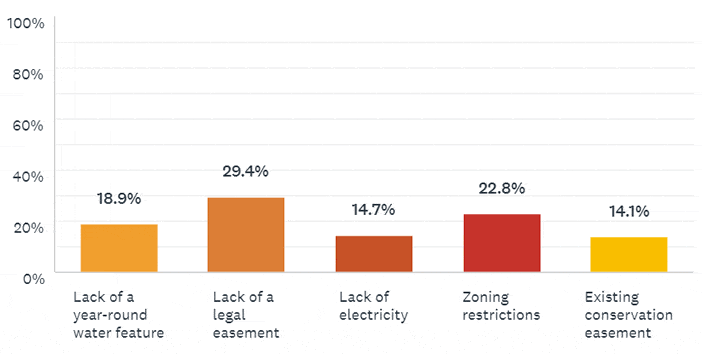Last month, the LANDTHINK Pulse posed the following question to our audience: Which do you see as the biggest drawback or deterrent when considering the purchase of rural land?
Our informal online survey revealed that 29.4% of respondents feel that lack of legal right of access to a property is the biggest deterrent to potential land buyers. Land without ingress and egress from a public road is referred to as “landlocked”, and the only way on or off the property is to cross land owned by someone else. A deeded easement is a “nonpossessory” property interest and is the best way to secure right of way in order to access landlocked property without having to trespass on adjoining land. Buyers of a landlocked property can propose and negotiate an easement with the adjoining landowner and usually come to terms on an agreeable price. A contingency clause can be included in the purchase contract, giving the buyer the right to back out if a written access agreement cannot be negotiated successfully with an adjoining landowner.
Dealing with a landlocked property can be a tricky legal situation, but risk-takers looking to score a deal should view a land locked property as an exciting prospect- potential buyers have a lot of negotiating power in terms of price. A buyer willing to put in the work, stands to benefit if property access can be legally obtained. Once legal access is gained, a property’s value will increase in value significantly.
Is being landlocked a deal-killer? In his LANDTHINK article Should You Buy Property Without Legal Access?, Curtis Seltzer has this to say about land access: “Well, like so many other things, it depends on the particulars. These no-access deals can be winners or absolute disasters. Only thorough research before submitting a contract will show you where on that continuum you’re likely to land—and even then it can be chancy.”
For those contemplating purchasing a landlocked property, seek the advice of a real estate attorney. When it comes to land access, as Seltzer explains in the article, “The general principle in real-estate law is that private property cannot be landlocked, that is, denied reasonable vehicular access from a public road. But states and their courts differ in how this principle is interpreted, and several situations can exist that modify the rule.”
Coming in a close second (22.8%) among our audience as another big deterrent to land buyers, were zoning restrictions. When buying land for sale, it’s important to know if the property is zoned for whatever use the buyer has in mind for it- like a house, mini-farm, or business. Property zoning is governed by local county or city laws (known as ordinances), which divide land into zones such as residential, agricultural, industrial, commercial, historical or mixed use. The zoning of a property determines how a buyer will be able to use it.
If a buyer hits a roadblock because of zoning restrictions, it is possible to change the way the land is zoned or obtain either a zoning variance or a special use permit that would allow a buyer to use the land as desired. Buyers should be aware that it is never easy to change a property’s zoning, but if they are up for the battle, buyers can sometimes walk away with a zoning change or variance.
One thing every land buyer can do is work with a real estate professional who knows land. A land agent can help buyers navigate the intricate details and get through the hiccups that arise in almost every land transaction. Land agents can often prevent buyers from giving up on a property they would really like to purchase. Performing due diligence on land requires more work and more time than other types of real estate and is a vital part of the land buying experience.
Not surprisingly, 18.9% of respondents felt that lack of a year-round water feature was a big drawback on a piece of land they were considering for purchase. Back in 2012, The LANDTHINK Pulse asked our audience: What improvement or feature do you think land buyers consider most desirable when purchasing land? That month’s survey question revealed that Water Feature Thought to be the Most Desirable Property Characteristic when purchasing land. Apparently the existence of a distinctive water feature is a motivating factor for land buyers. A water feature is a physical characteristic of property that adds both value and enjoyment.
The LANDTHINK audience certainly expressed mixed views on what they consider to be the biggest drawback when considering the purchase of rural land. The results were all over the board, but the largest percentage (29.4%) indicated that lack of a legal easement was the biggest deterrent, followed closely by 22.8% of our audience, who indicated that zoning restrictions were more concerning. A large percentage (18.9%) said that lack of year-round water feature would be a flaw in a property they were considering purchasing. Lack of electricity (14.7%) and an existing conservation easement (14.1%) were of least concern to respondents.
Here’s how the results panned out:

We were pleased that so many people chimed in on this question, and we thank everyone who answered the Pulse and shared it on social media with friends and connections in the land industry. LANDTHINK would like to extend a big thank thank you to The Land Show with Dave and Johnny for sponsoring the March Pulse and for coming up with a very interesting question to pose to our audience. The show can be heard throughout the state of Alabama on Saturday mornings. Visit their website for a list of the locations and stations. Dave Milton and Jonathan Goode, land agents with Southeastern Land Group, host the show and want to introduce land investing to capable investors and help land owners reach true market potential when listing their properties.
Become a Pulse sponsor! It’s a great way to ensure your brokerage is the first one buyers and sellers call when they have a need to buy or sell property. You’ll get insane exposure on Social + Email + Web. That’s 500,000+ monthly eyes on you! Once you have it, you won’t want to give it up! Pulse sponsorships are offered on a first come first serve basis and are subject to certain limitations. If your business would be interested in sponsoring the May Pulse question, please contact us soon.
Do you have a suggestion for next month’s Pulse question? Submit your question and we might choose yours!
We want to know what you think about our April Pulse question, chosen and sponsored by Satellite Prolink: How trustworthy are buy/sell groups on social media sites for buying and selling real estate? Answer now.
This content may not be used or reproduced in any manner whatsoever, in part or in whole, without written permission of LANDTHINK. Use of this content without permission is a violation of federal copyright law. The articles, posts, comments, opinions and information provided by LANDTHINK are for informational and research purposes only and DOES NOT substitute or coincide with the advice of an attorney, accountant, real estate broker or any other licensed real estate professional. LANDTHINK strongly advises visitors and readers to seek their own professional guidance and advice related to buying, investing in or selling real estate.










Add Comment